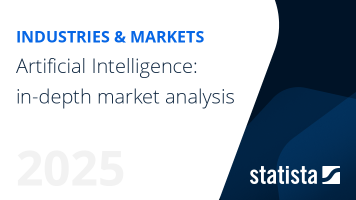The Text-based NLP Market in Brazil is experiencing mild growth, influenced by factors such as the increasing adoption of artificial intelligence, growing awareness of NLP technology, and the convenience of online language processing services. These drivers are contributing to the market's steady growth rate in the country.
Customer preferences: The rise of e-commerce and online shopping in Brazil has led to a growing demand for NLP-powered chatbots and virtual assistants to enhance customer service and improve the overall shopping experience. This trend is driven by a growing preference for convenience and personalized interactions with brands. Additionally, the increasing adoption of digital payment methods and the emergence of voice commerce are also contributing to the growth of the Text-based NLP Market in Brazil.
Trends in the market: In Brazil, the Text-based NLP Market of the Natural Language Processing Market within the Artificial Intelligence Market is rapidly expanding, driven by the increasing demand for advanced language processing technologies in various industries. This growth is expected to continue as more companies adopt NLP solutions to improve customer service, automate processes, and gain insights from large amounts of text data. Moreover, the rise of chatbots and virtual assistants in the country is expected to drive further growth in the NLP market. This trend not only presents opportunities for NLP providers but also for other stakeholders, such as businesses looking to streamline operations and improve customer experience. However, with the increasing use of NLP in sensitive areas like healthcare and finance, there is a growing need for regulations and ethical standards to ensure the responsible use of these technologies. As the NLP market in Brazil continues to evolve, it will be crucial for industry stakeholders to stay updated on regulatory developments and incorporate ethical considerations into their strategies.
Local special circumstances: In Brazil, the Text-based NLP Market of the Natural Language Processing Market within the Artificial Intelligence Market is thriving due to the country's large and diverse population. The market is heavily influenced by the unique linguistic characteristics of Brazilian Portuguese, which require specialized NLP solutions. Additionally, the country's complex regulatory landscape, including data privacy laws, has a significant impact on the development and adoption of NLP technologies. Furthermore, Brazil's rapidly growing tech industry and increasing investment in AI research and development are driving the demand for NLP solutions in various industries, such as healthcare, finance, and e-commerce. The country's unique cultural and economic factors, combined with the government's support for innovation, make Brazil a promising market for Text-based NLP solutions.
Underlying macroeconomic factors: The Text-based NLP Market of the Natural Language Processing Market within the Artificial Intelligence Market in Brazil is heavily impacted by macroeconomic factors. The country's economic health, as well as global economic trends, play a significant role in the market's performance. Fiscal policies, such as government investments in research and development, also influence the growth of the market. Furthermore, Brazil's increasing focus on advanced technologies, coupled with its supportive regulatory environment, is driving the demand for text-based NLP solutions. This is further fueled by the rising demand for digital transformation in various industries, including healthcare, banking, and retail.








